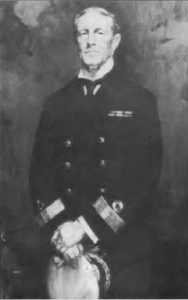- Author
- Patterson, Andrew Barton (Banjo)
- Subjects
- Biographies and personal histories, Ship histories and stories, WWI operations
- Tags
-
- RAN Ships
- HMAS Sydney I
- Publication
- March 2000 edition of the Naval Historical Review (all rights reserved)
November 1914 – En route for the Great War as a correspondent. We have two battalions of infantry on board. A topsy-turvy force this, for the Brigadier, General MacLaurin, has never seen any active service, while the ranks are full of English ex-service men, wearing as many ribbons as prize bulls. These English ex-service men, by the way, volunteered to a man when the war broke out, and the Australian ranks were full of Yorkshiremen, Cockneys, and Cousin Jacks. Every one of them had the fixed idea of getting a transfer or clearing out and rejoining his old regiment as soon as he got to England. Who can blame them? It is the English way. Any one of them would sooner be shot as a private in the Coldstream Guards than get a decoration in the nameless Australian force. By the end of the war, we ourselves had a tradition.
Fortunately, this expedition was halted in Egypt for training, so they had to stick to the show whether they liked it or not. When we talk about the glories of Gallipoli we should give credit to the fifty per cent or so of Yorkshiremen, Cousin Jacks, Cockneys, etc, who did their share in it.
Among our personnel was a gigantic lieutenant named Massie, an international cricketer, strong and rugged as an iron-bark tree. By some freak of fortune he had been made adjutant of his battalion though he knew no more about military routine than he knew about flying. His first question was: `How am I to mount guard, when we haven’t got any horses?’
It was through friendship with Massie that I got in touch with a celebrity – the man who commanded an Australian warship in the first fight fought under the Australian flag. It is not often that we get from the silent navy an account of a fight from the lips of the man who fought it.
November 15th – Colombo. Arrived in Colombo to find everybody in a wild state of excitement over the sinking of the Emden by the Sydney. We can hardly believe that Australia’s first naval engagement could have been such a sensational win, for our people are not sea-going people and our navy – which some of us used to call a pannikin navy – was never taken seriously. And now we have actually sunk a German ship!

Colombo harbour is a wonderful sight with warships, transports, merchant-men, Japanese, Russians, English and Australian ships. There is the Russian man-of-war, Askold, reported sunk in the Russo-Japanese War, also reported sunk by the Emden, and that she sunk the Emden in this war; Abouki (Japanese), Hampshire (English), and, best of all, alongside the long breakwater the four funnels – the two funnels with white streaks round them – of the Sydney. It sort of wakes us up to the idea that we have a country.
The gigantic Massie offers to take me off to interview Glossop, the hero of the Sydney-Emden fight. Massie’s people are of considerable importance in Sydney and he has entertained Glossop at his house; so, he says that if I go with him and listen to what Glossop says I may get some stuff that the other correspondents wouldn’t get. This Massie is about six feet two in height, broad in proportion, and he must be all brains. Any man that can make a success as adjutant of a raw battalion, without any previous experience whatever, can do anything.
We find Glossop in mufti, having a drink by himself, a typical English sailor-man, not a bit excited by the fact that he has `woke up to find himself famous’: to him the whole affair is a matter of range of guns, weight of metal, speed of ship, and of course a good deal of luck.
`Well, Massie, I had a lot of luck, didn’t I?’ he says. `Fancy her coming to Cocos just when we were right on the spot, and fancy just having the luck to be on that side of the convoy. If I’d been on the other side, then I wouldn’t have got the job. Of course I had the speed of her and the guns of her, but if our people hadn’t served the guns properly or if she’d dropped a shell into our engine-room, we might have been sent to the bottom instead of her. You can work out a fight on paper, and one shell will upset the whole calculation.




